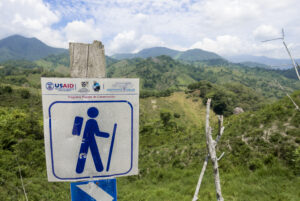Unions Take Action against “Collective Pacts”
In response to the rise of so-called “collective pacts,” which are often formed to circumvent labor rights and undercut unionization, 50 Colombian unions presented complaints against this illegal form of contracting to the Labor Ministry on Thursday, May 15. The pacts effectively eliminate the ability of workers to organize strikes or bargain collectively. Indeed, according to a study by the National Labor School (ENS), in 86 percent of the cases surveyed, the pacts offered the same benefits of a union agreement but required the workers to renounce any union affiliation they had. The unions hope to demonstrate that these pacts are a real and serious problem, and urge the Ministry to develop a specialized unit to investigate and sanction the illegal use of the pacts. This Labor Ministry oversight is required under the U.S.-Colombia Labor Action Plan, which commits the Colombian government to verifying that said pacts are not used as union-busting tools and respect the basic labor rights of workers.
U.S. Must Support Justice for Illegally Fired Sugar Workers
Five years after their illegal mass firing, the workers of the San Carlos sugar mill appear closer to achieving justice in their case thanks to mounting international pressure. After filing a complaint that their firing was facilitated by two Labor Ministry officials not authorized to work in the region, a subsequent labor department investigation has nullified the “conciliation” that formalized the firing. The two ministry officials have appealed the decision, and it is now in the hands of Labor Minister Rafael Pardo. We encourage you to express your interest in this case (Auto 00127), and encourage Minister Pardo to reach a decision in a timely manner.
See also: WOLA letter to Min. Pardo
Oil Palm Company Sanctions Require U.S. Monitoring to Ensure Enforcement
On a positive note, the Labor Ministry announced that it was sanctioning Palmas de Cesar and nine cooperatives for labor intermediation. Palmas de Cesar was found to not be complying with the cooperatives law and fined 3,500 minimum monthly salaries or an estimated 1.1 million dollars. While this is a good first step, the U.S. should monitor implementation of these sanctions to guarantee that they are ultimately paid and lead to changes that further the goals of the U.S. Colombia Labor Action Plan.
USO Oil Workers Union Will Return to Rubiales Oil Fields
The Oil Workers Union (Unión Sindical Obrera, USO), which represents 26,000 oil and energy workers, is planning to return to Campo Rubiales (Meta) at the end of May. They will try to reestablish an office and to organize workers, despite the serious obstacles and violent reprisals they have faced since 2011 to do so. This courageous action requires international support and in particular that of the U.S. Government to make sure that unionists and workers are protected and able to organize workers without being attacked. We strongly urge the U.S. Congressional Monitoring Group on Labor Rights, U.S. Department of Labor, the Office of the U.S. Trade Representative, the International Labor Organization, and the U.S. Embassy in Bogotá to accompany this effort and to send strong messages to the Colombian Labor Ministry, the Canadian Government and companies operating in the region that reprisals and illegal union-busting activities will not be tolerated by the U.S.
SINTRAMERCATTEL Workers in Cali Duped In Order to Weaken Unionization
On May 2, the National Trade Union for MERCATTEL Workers (SINTRAMERCATTEL) called upon the Minister of Labor to intervene on their behalf with the telecommunications company Claro. Claro had asked workers to resign their jobs with MERCATTEL with whom Claro had a contract since the company was now going to partner with another company called TELCOS. The workers were promised that if they resigned and turned in their uniforms that they would be rehired by TELCOS. This was asked of over 300 workers including an estimated 80 who are affiliated with SINTRAMERCATTEL union. The MERCATTEL office in Cali closed shop, yet the workers were not rehired. These workers are left without jobs, many without having received their last salaries and most with outstanding debts to pay since their salaries are outstanding. As a result, the workers have organized a protest and are calling on the Ministry of Labor to intervene in their case. U.S. policymakers should ask the Labor Ministry to address this situation and work with TELCOS to get these workers hired with full guarantees that they will get direct contracts and be able to organize and affiliate with trade unions.
High Profile Sugar Unionist Remains at Risk of Harm
On April 15, 2014 WOLA urge U.S. policymakers to intervene to guarantee protection for Jhonsson Torrez, the Afro-Colombian Vice President of SINTRAINAGRO’s Florida Office and Comptroller of the Afro-Colombian Labor Council. Mr. Torrez had reported that the National Protection Unit (UNP) decided to take away his “hard” security measures which had included an armored car and two escorts and reduced them to one escort and a transport subsidy. These changes took place without giving Mr. Torrez an explanation and in spite of the fact that he has reported death threats to both the UNP and Attorney General’s Office. Thankfully the labor official at the U.S. Embassy took steps to try to resolve this security situation. Yet despite the goodwill of the U.S. government the situation remains unresolved. We, therefore, ask that U.S. policymakers continue to highlight the need for guaranteed security measures for Mr. Torrez and that his measures to be adjusted according to his threat level.

